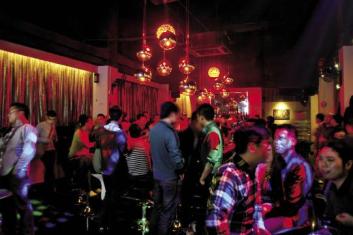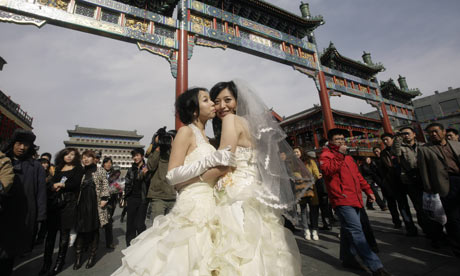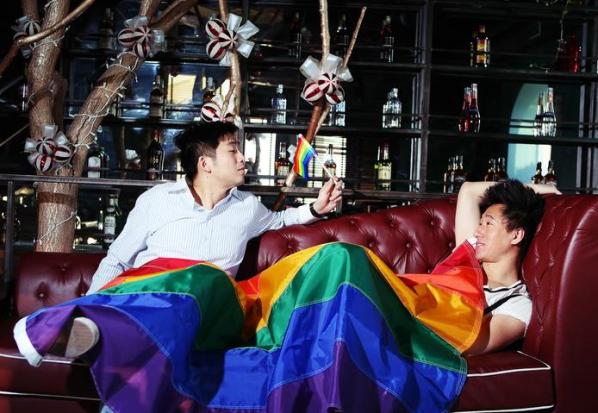
Q Bar in Shanghai
After receiving reports that a male go-go dancer was performing a “pornographic” show at the recently opened Shanghai Q Bar on Saturday, police raided the bar and took between 60 and 70 people into custody, including patrons and staff members.
“The raid, which coincides with one of the most concerted government crackdowns on dissent in a decade, sent a chill through China’s burgeoning gay community, which in recent years has grown self-confident despite intermittent harassment from the authorities. Gay activists say they cannot recall an incident in which so many people were taken into custody in one fell swoop.”
The detainees were then held for, in most cases, over 12 hours. Several have since complained about being denied food or water and being treated roughly. A first-hand report on Shanghaiist says that one detainee was questioned as a witness and was held longer after refusing to agree with a policeman’s version of what happened:
“He told me, you know, we’ve invited you here to be a witness. This is not against you. You need to cooperate with us. Once you’re done cooperating, you can go home and rest, and won’t have to stay here any longer. Later, he asked me about the details of the two dance performances — was [the dancer] wearing a transparent brief, was anyone inserting money into his underwear, etc. This went on for a while, and then he began typing. […] When the computer printout finally came, it was just as I expected. The details related to the second dance performance were not what I said at all. […] I said, I’m unable to sign this. Then the policeman told me to go back to the room and continue waiting.”
Unlike the most famous bar raid ever, Stonewall 40 years ago, Q-Bar isn’t an underground affair — not that it legitimately matters, as fancyness isn’t a factor for potential criminal activity (often quite the opposite) — but interesting nonetheless. Q-Bar is an upmarket lounge in a “revitalized waterfront district” owned by gay & lesbian scene veterans “Tony and Tony.” They have go-go dancers and sexy posters as well as martini nights and a “well-selected” wine list.
The Shanghai City Weekend reported that although the “wildly popular” gay club “Deep” closed recently due to “trouble with authorities” — “homos running around premier property areas was frowned upon by the powers that be” — the paper describes Q-Bar as a departure from the controversy surrounding other establishments:
“Securing the licenses took a bit more than two months, but this is quite normal,” says Tony. “The gay scene is no longer underground, the market is bigger and people have more money to spend. They deserve something better — a better environment, better drinks and quality service. We are dedicated to providing all of these.”
So what’s going on here?
China decriminalized homosexuality in 1997 and removed it from a list of mental disorders in 2001, but is still really far from accepting it. There are markets in which lesbians and gay men hook up in convenience marriages because family is an expected part of life and, in the words of one attendee, “In my view, a 30-year-old man should start thinking about having a family, but two men can’t hold each other’s hands in the street. We’re not allowed to be a family.” Gay marriage is so far away from the table that it’s not even in the same building (while it was discussed when other marriage laws were re-evaluated in 2003, it is currently still illegal).

some Chinese are campaigning for same-sex marriage
In 2003, the first undergraduate gay studies course was added to the curriculum at Fudan University in Shanghai and in 2007, a China chapter of PFLAG was founded. Shanghai’s first pride festival was held in 2009, though it was very subdued and some events were cancelled by authorities at the last minute. The organizers were also warned by their lawyers not to hold a parade, because of the possibility it would be seen as a protest. From a 2009 article in The Economist:
“Life for China’s tens of millions of homosexuals has improved markedly since [homosexuality was decriminalized], especially in big cities. Gay and lesbian bars, clubs, support groups and websites abound. Chinese gays, who playfully call themselves “comrades”, have plenty of scope for networking. One surprising website caters specifically for gays in China’s army and police force.”
However. What about that thing that happened last year when that guy saw two lesbians kissing in “boyish fashions” and did not throw up in his mouth a little bit? Yes, back in September, a man wrote a letter to the New York Times about how he saw two girls kissing “romantically” on the subway in Shanghai and went on to observe that “contemporary China is the scene of the most rapid, transformative change of any large country in the world today,” where “sexual choice and expression” is changing in ways “far more dramatic than even the physical landscape.”
Huh. As we reported in September, the US China-Today’s article on Homosexuality in China painted a less voyeuristic and more hopeful perspective on rapidly changing attitudes towards homosexuality in Hong Kong and, even more recently, in mainland China. This rapid change in China is attributed to a “lack of religion,” an influx of expatriates, higher education and the homo-friendly One Child rule and cites barriers to change including a strict expectation of heterosexual marriage as the expected life course, a lack of representation on television and in newspapers (censored by Chinese media) and a gigantic generation gap with many older people still believing homosexuality is an illness.
But China has its own Manhunt, so there’s that. A Shanghai City Weekend article from last year declared: “Although being open about one’s sexual orientation at work is a big deal for many gay people, being gay is no longer such a social taboo in Shanghai” and that many gay citizens were even able to be out at work.

contestants in the 2010 Mr. Gay China Pageant
Wikipedia says that “many cases show that those participating in gay activity are still punished by the justice system and pursued by the police, and may be detained and arrested.”
Steven Bao, a bar DJ, said he believes the raid happened after other competing clubs complained, in an attempt to intimidate Q Bar — if that’s true hope the competing clubs feel really guilty for what they started. The police had no comment on their rationale but the police report states that several people were living in a makeshift shelter on the roof of the bar, and that they “often saw naked men on the roof, drinking beer, chatting loudly, even having sex.” There’s so many things wrong with that being used as evidence to arrest 60 men in a bar that I don’t even know where to begin.
So far no one has been charged although several detainees report being asked specifically about the go-go dancer. The go-go dancer and Bao the Bar Owner are still in custody.
Is this a double-standard where two girls kissing on the subway is acceptable but gay men are targets of police action? Are they just easier targets because gay men actually get up, get dressed and go out to socialize with other humans whereas most lesbians apparently prefer to cuddle on the couch? Is it a reflection of the unease conservative cultures feel about effeminate men? Is it just as bad for lesbians? Is it like the opposite of the Philippines? Or is this just part of the crackdown on dissent and if so, how is this gay bar related to dissent? Is Autostraddle blocked by the Great Firewall of China? The answers to these questions and more — in the comments.



It’s Stonewall time, baby
I’m Chinese, and from my perspective of things in China, I think these men were treated in largely the same way that most other people would be treated if detained. Police are unnecessarily rough, rude, and will change reports. I don’t think this was so much a gay discrimination thing as it is a “China has some serious issues with its police” thing.
My experience is that when there’s no religious base to oppose it, people largely just don’t care about your sexuality, although some people are kind of “weirded out.” I know my largely conservative family just doesn’t care at all because it just isn’t a CAUSE or a THING in China the way it is here. BTW, the Chinese term for homosexual is “tong ai ren” which kind of, word-for-word, translates to:
tong: together/similar
ai: love
ren: people
which I find cute in its own curious linguistic manner. “together love people?” Yes! :)
I’m kind of surprised about the whole extra discrimination against the guys thing. Maybe it’s because hetero displays of affection between women are so strong in china – you will regularly see two female friends holding hands and nobody thinks anything of it, which means if you’re holding hands with your girlfriend, nobody really realizes you’re not straight. So it’s easier to “hide” in a way.
I love languages. And your linguistic insight is the first time I’ve ever thought of the Chinese language as “adorable”. I mean, “tong ai ren” is quite possibly the most adorable translation I’ve heard in a very very long time.
i thought the term was ‘tongzhi’ which translates to ‘comrade’ and was actually originally a soviet word? actually it might be the same thing:
tong – same
zhi – goal/spirit/orientation (not sure if this part is right?)
i did some research on this for a class a while ago and i think it’s really interesting because ‘comrade’ is this super important word that chinese gays are using to try and show how they fit in with “regular” society, while westerners appropriate a formerly derogatory label (‘queer’). i actually think it says a lot about chinese and western culture.
i agree that most people who are arrested in china are treated this way as well, so this isn’t abnormal, but no less disturbing. i feel like this is part of china’s larger crackdown on dissent, and they’re just being really strict.
“Tongzhi” is the slang word. The English equivalent of “tongzhi” would be “gay”, whereas the English equivalent of “tong ai ren” is “homosexual” (not in a negative connotation sense the way NOM & cronies use it; just as a more technical term).
Sorry! that was meant as a reply to Emily. :)
I’ve only really heard tongzhi/comrade be used as a slang word for being gay in Taiwan. I thought it might have been them taking the piss out of Communist China.
I’ve never heard “tong ai ren” be used as homosexual in either country, instead I learnt it as “tong xing lian” which literally translates to “same sex loving”.
As far as I know, Autostraddle is not blocked by the Great Firewall of China since it doesn’t have a blogging site url.
I also agree with Zen about how authorities are usually extra discriminatory against gay men because it is so common to see women being affectionate with each other. Men can be effeminate, but they can’t be showing affectionate behaviour with each other in public. Chinese culture is weird like that.
yeah i agree. I’ve never heard of “tong ai ren”.
like you i first heard of “tong chi”/ comrade (i’ve also heard “nu tong chi” for lesbians) in Taiwan. and the official term i know of is also “tong xing lian”.
Maybe it was just a local term? I mentioned my GBF to my cousins and they were like, “tong ai ren?” so I went with it. Maybe it’s an outdated term too? For reference, that was Sichuan (or Szechuan for people who eat american chinese food)
Yeah, I saw so many ladies holding hands and got super excited until I realized it wasn’t what I thought it was haha
I forgot to add – one thing I find BEYOND fascinating is the yaoi fangirl dealio that’s so prevalent in Asia, even in China. As in hetero girls get wet for guys making out with each other. It’s become such a popular culture thing! One music company – SM, who owns the boyband Super Junior, actually *makes* them make out during performances. And then the girls go wild. Considering the culture, it’s just the oddest fanservice ever.
I’ve heard of yaoi. Didn’t pay much attention to it because it seemed to be associated with fan-fic. Which I hate. But you make it sound kinda sweet. It’s kinda strange, over in the Western world guys are all over girls making out, but over in Asia it’s the girls going crazy over guys making out.
It also might be helpful to consider the way social society in China is organized and has changed since as recently as 2000. I have lived intermittently in China for nearly 25 years and the changes are very dramatic. When people discuss the rapid transition for gay people and rights in China you have to see that as a trend moving along with a general change in Chinese attitudes.
For example ten years ago the very notion of a night club, not a gay club or one that caters to any group, but any place where people got together to dance was a foreign notion. Night clubs didn’t exist to most/any Chinese. This is probably why a gay club is still a dangerous place in China. If people want to get together in large social groups in China it is mostly through government or educational resources. The It’s an untenable situation and the government can’t keep this up without risking the gains made in China over the past 20 years. I am somewhat hopeful still, that if the Chinese government is able to make political reforms that are need the rights of minority groups could take strides along side society as a whole.
Also I have to agree with the above commentators the general attitudes of Chinese are fairly innocuous from my experience. I don’t see anything near the potential for vitriol that some people in America might show. But then again it’s still a “new” thing in China. Sorry for the long post I hope it added some perspective from someone who has one foot in both China and USA in addition to the above commentators.
As a gay American living in rural China I can say that this news is not surprising at all given the current political climate.
Chinese attitudes towards gays may be trending positively in metropolitan areas, but here in the countryside people are more conservative/repressed when it comes to sexuality in general and it is absolutely not OK to be gay. Basically I live in Chinese Arkansas. Even some colleagues at the socially progressive organization I work for still refer to gayness as “strange” and would not react well if I came out.
Jumping back in the closet when I came here was miserable but at least for me there is a light at the end of the tunnel. I can’t imagine what it would be like to live here without the ability to access the free internet or areas of the country that are more progressive.
Recently I learned that suicide is the leading cause of death amongst Chinese aged 15-34. While there are several large factors figuring into those statistics, I suspect that sexual and political repression (oppression?) contribute to a tremendous sense of dissatisfaction and hopelessness particularly among the youth. For a country who’s economy is developing at a blistering pace, they are embarrassingly behind as far as attitudes towards gay people are concerned and it doesn’t look like that’s going to change in any significant way anytime soon.
To answer your question, AUTOSTRADDLE is not blocked by the firewall (for now) unlike Afterellen. Thank god.
Where in China are you now? haha chinese arkansas. My dad told me that in the village where he grew up, they didn’t and still don’t have a term for “gay,” because the idea is completely foreign to them. They only recently came up with a term for God, which I also find utterly fascinating.
I feel like the suicide rate is more closely, perhaps, tied to an inability to follow a singular lifestyle. I know a huge amount of those deaths are a result of gaokao and the horrible job environment…it’s the way politically how everything is set up, there’s just this one singular path to success and it’s much too easy to veer off. But yes, definitely a result of the political climate.
The curious thing about the repression is that so many people are unaware it’s even there.
I live in Ji’an, which is in the southeast province of Jiangxi. Jiangxi is one of China’s largest exporters of migrant workers and I do agree with you that gaokao (China’s SAT), which essentially determines your future, is a huge source of stress for the youth population. I live on the campus of a third-tier university where students do not pick their majors or classes. There is a strong sense of universal resentment about this and most people describe their college experience as rather boring. They have an 11:00pm curfew for god’s sake.
A previous commenter mentioned the innocuousness of Chinese homophobia. I agree it’s less dangerous to be gay here than, say, Uganda. However the completely absence of freedom of expression or assembly, which are western luxuries, is truly devastating. Even for me, an out-and-proud lesbian until 5 months ago, this invisible burden has begun to affect my interactions with people quite significantly.
On a lighter note, Chinese girls love to wear tracksuits and I’ll be damned if that isn’t the most attractive thing I’ve ever seen EVER. #latentgymteachercrush